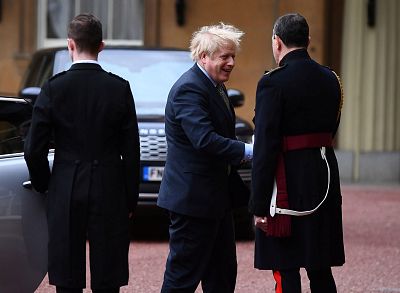Analysis: A simple message, changing voter behavior and Brexit fatigue propelled the Conservatives to a big win.
LONDON — As with the rest of the country, the balance of power has fundamentally shifted in the Palace of Westminster, the neo-Gothic home of Britain's Parliament.With Boris Johnson's crushing electoral victory in Thursday's vote beating the most recent opinion poll predictions, political strategists and election watchers are speculating what changed to give the prime minister such a big lead.One answer is the Conservatives' simple campaign based around a single memorable slogan, "Get Brexit done," which appealed to a public exhausted by years of debate and Parliamentary deadlock over how and whether to leave the European Union.By embracing Brexit, Johnson's Conservatives planted themselves firmly on one side of a cultural divide between those who have benefited from a globalized economy, and those who have not."Brexit means a whole range of things, not just leaving the European Union," said Anand Menon, professor of European Politics at Kings College, London. "It means honoring the vote, getting the establishment to do what they were told."There are lots of things bundled up in that," he added.Labour's vote share was down everywhere except in major cities, the exit poll showed, suggesting the Tories also successfully appealed to rural and small-town voters. But another factor is education and life skills: The Conservative vote increased the most in constituencies with the least university graduates.
 ADVERTISEMENT
ADVERTISEMENT
 ADVERTISEMENT
ADVERTISEMENT
There are long-term trends at play, experts agree.The 2016 Brexit referendum was when some traditional supporters of the left-wing Labour Party first considered switching, a process that's matured in this election, experts say.Industrial heartlands with long traditions of trade unionism and manual, low-skilled work — places most affected by Conservative cuts to public services — either abandoned Labour or seriously considered it, something unthinkable just a few years ago.Many of those who voted Labour before 2016 were doing that largely on a legacy basis, without actually believing a lot of the values that today's party upholds, said Tim Bale, a professor of politics at Queen Mary University, London.Now the party is widely seen to be home to college graduates with socially liberal views, while the Conservatives have transformed themselves into a home for many with relatively less education and less of a global outlook."Brexit broke the spell for those people and made them realize that often their values were more closely aligned with those of the Conservative Party," he added.And while the Conservative campaign was well-executed, it was undoubtedly helped by the unpopularity of its opponent: Labour leader Jeremy Corbyn.The lifelong socialist will be remembered for leading Labour away from being a center-left political force that won three elections under Tony Blair, to a radical left-wing party that called for a socialist economic transformation.Corbyn represents the inner-London suburb of Islington North, has championed human rights cause across the world and was fiercely opposed to the 2003 invasion of Iraq.While he is popular among the party faithful — membership swelled under him — many of his parliamentary colleagues vehemently opposed him.His was badly blighted by accusations of anti-Semitism among some of his most fervent supporters, as well as past alleged support for the Irish Republican Army (IRA)."The Conservatives had a huge advantage in that Boris Johnson was fighting the most unpopular opposition leader we've seen since polling began," said Bale. "You can't ... hope to win a mandate if you have a leader seen as widely seen as unpatriotic, as weak, as incompetent and as indecisive, and indeed as soft on terrorism and anti-Semitic."However, Johnson may not have it all his own way in the months ahead. If the country does leave on Jan. 31 the United Kingdom can finally begin talks with the European Union over a crucial trade deal, while in a transition period.
The Conservatives have promised to finalize this deal by December 2020, but it's a tortuous and complex process that normally takes years. He may have to extend the transition period beyond December, angering the Brexit-voting public and many of his own lawmakers, or quickly sign a deal with at submits to the E.U.'s demands.Neither scenario is appealing for Johnson."The seven months he's given himself to negotiate a trade deal with the European Union is frankly ridiculous, it simply cannot be done," said Bale.And while Johnson talks of widening the party's appeal to embrace the voters who have "lent" him their votes in this election, the party may be storing up future trouble in case this uneasy coalition of former Labour voters and ideological Conservatives falls apart.Bale added: "There is a mismatch between appealing to working class voters who are small-c conservatives on cultural issues on one hand, and running a party that at Westminster and in the membership who want a small state with less spending and lighter regulation of employment, consumer and environmental standards."











